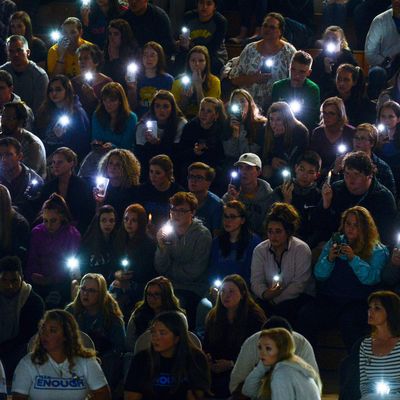
In the aftermath of Tuesday’s shooting at a suburban Denver high school, where one student was killed and another eight were injured, Colorado District Attorney George Brauchler asked the media to “adopt a ‘no-notoriety’ approach.”
“I know that you have an obligation to report the name, the identity. I know you have the obligation to put out a picture,” he said. “But soon, very soon, let us move past focusing on the identity of the suspects and their images and focus instead on the innocent victims of this crime and the investigation itself.”
48 hours later, Brauchler should be satisfied. Far more news coverage has been devoted to Kendrick Castillo, the 18-year-old who was killed in an act of heroism Tuesday, than to the suspects in his murder. One local outlet, Fox21 News, announced that it would not show any images of the suspects and would instead focus its coverage solely on the victims. And NBC News host Gadi Schwartz, in a broadcast of the network’s SnapChat news show, chose not to name the suspects. “No notoriety,” he said.
Six years after the founding of the group No Notoriety, the movement is catching on. Started by Tom and Caren Teves after their son Alex was killed in the 2012 Aurora theater shooting, No Notoriety calls for the media to deprive mass shooters of infamy, which it calls “a well-known motivating factor in rampage mass killings and violent copycat crimes.”
The San Diego Union-Tribune’s editorial board acknowledged the same factor last month when it announced a new policy: The newspaper will no longer name mass shooters in editorials. “Not every mass shooting is the sick work of someone who wants their name to live forever on a roster of rampage. But since shooting contagion exists, we can help minimize it,” the board wrote.
A shift in focus, away from the shooters and toward mourning the victims, has been evident in the aftermath of several recent shootings. Coverage of Riley Howell, who was killed while tackling a gunman in his college classroom last week, has far outpaced coverage of his killer. New Zealand Prime Minister Jacinda Ardern refused to speak the name of the white supremacist who gunned down 51 people at two Christchurch mosques last month. The PittsburghvPost-Gazette won a Pulitzer for its victim-heavy coverage of the Tree of Life synagogue shooting last year.
Jaclyn Schildkraut, a professor at State University of New York at Oswego and author of Mass Shootings: Media, Myths, and Realities, wrote in February for Vox that outsized media attention to mass shooters can inspire others:
There are a number of problems with the intense media focus on mass shooting perpetrators. First, they are explicitly seeking fame, and the media is helping them to achieve this end. The realization that this route to fame “works” can, in turn, produce more lethal events and foster one-upmanship among perpetrators.
The copycat effect is real. A 2015 study suggests that a mass shooting increases the likelihood of an additional mass shooting in the two-week period following the incident.
A more recent study was less supportive of the thesis of short-term contagion but still cautioned that the media coverage of these attacks might well lead to copycat events over a longer period.
Even the Trump administration has taken notice, with the White House’s School Safety Commission calling for “no notoriety” for schools shooters last year.
The discussion has recently filtered down, from activists and academics to newsrooms. Along with the recent decisions by the San Diego Tribune, Fox 21, and NBC News, Emily Richmond of the Education Writers Association has encouraged a rethinking of how mass shootings are covered. Writing for the the Columbia Journalism Review in February, Richmond said one of the questions reporters must grapple with is “when their news outlets will name perpetrators, and how often.”
The argument is not that the shooter’s names should be blacked out, No Notoriety founder Tom Teaves recently told the AP. It’s that their names should be used rarely and to “portray them for what they are” he said. “They’re horrible human beings that are completely skewed in their perception of reality, and their one claim to fortune is sneaking up behind you and shooting you.”





























